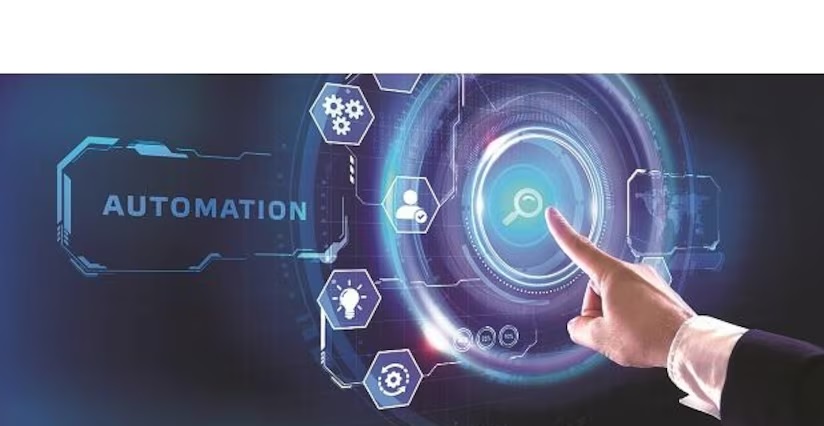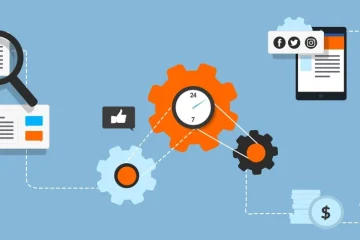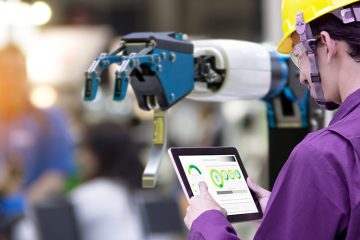The Future of Automation in Business Used by Top Companies

In today’s fast-paced, technology-driven world, automation has become more than just a buzzword. For top companies across industries, it has evolved from a luxury to a necessity. As businesses face increased competition, the need for efficiency, scalability, and cost-effectiveness has never been more critical. In this context, automation stands as a powerful tool to help organizations streamline processes, reduce operational costs, and improve overall productivity.
The future of automation in business is not just about replacing human effort with machines; it’s about leveraging intelligent systems and technologies to optimize workflows, enhance decision-making, and unlock new opportunities for growth. As the tools, capabilities, and applications of automation continue to advance, the landscape of business operations is shifting, with companies leading the way in transforming the nature of work itself. Here’s a closer look at the future of automation, the trends shaping it, and how top companies are using it to stay ahead of the curve.
1. The Rise of AI-Powered Automation
One of the most significant shifts in automation is the increasing integration of Artificial Intelligence (AI) into business processes. AI-powered automation goes beyond simple task automation by incorporating machine learning and natural language processing to enable systems to make smarter decisions, predict trends, and respond to complex challenges.
Top companies like Amazon, Google, and Tesla are already at the forefront of AI-powered automation, using AI to optimize everything from supply chains to customer service. Amazon’s use of AI in its fulfillment centers, for example, involves robotics systems that don’t just carry products but are also able to adapt to changing conditions, manage inventory autonomously, and optimize storage space in real time.
In the future, AI-powered automation will continue to evolve, handling increasingly sophisticated tasks. For businesses, this means a greater ability to automate processes such as predictive analytics, customer segmentation, and even personalized content delivery—transforming business models to be more agile, data-driven, and efficient.
2. Robotic Process Automation (RPA) Becomes More Widespread
Robotic Process Automation (RPA) refers to the use of software robots to automate repetitive, rule-based tasks that were traditionally handled by human workers. While RPA has been around for a few years, its potential is only beginning to be realized by leading companies in various industries.
Companies like UiPath, Automation Anywhere, and Blue Prism have made significant strides in bringing RPA to businesses of all sizes. Top companies are now deploying RPA in areas such as finance, HR, customer service, and supply chain management to automate processes like invoice processing, payroll, and data entry.
Looking ahead, RPA will not only handle repetitive tasks but will also evolve to manage more complex workflows, contributing to the overall digital transformation of businesses. By integrating RPA with AI and machine learning, companies can achieve a higher level of cognitive automation—systems that not only follow rules but can learn and adapt over time.
3. Intelligent Automation in Customer Service
Customer service is one area where automation is already having a profound impact, and the future promises even more intelligent and seamless interactions. AI-powered chatbots and virtual assistants are set to become more advanced, enabling businesses to offer personalized customer support at scale.
Companies like Zendesk, Salesforce, and Intercom are leading the charge in automating customer service with AI and machine learning. In the future, these systems will become even more intuitive, using data to predict customer needs, proactively solve issues, and offer personalized recommendations based on past interactions.
Furthermore, the integration of voice assistants like Amazon’s Alexa and Google Assistant into customer service channels will allow businesses to offer voice-activated support, driving deeper engagement with customers. Top companies will be able to deliver 24/7 support, reduce wait times, and provide highly personalized service without human intervention, all while improving operational efficiency.
4. Automation in Decision-Making and Data Analysis
In an increasingly data-driven world, the ability to make informed decisions quickly is crucial to staying competitive. Automation in data analysis is poised to revolutionize how businesses process and interpret vast amounts of data, ultimately aiding decision-making in real-time.
With platforms like Tableau and Power BI, businesses are already leveraging data analytics automation to streamline reporting, uncover trends, and make faster decisions. However, the future of automation in decision-making goes beyond just visualizing data; it involves AI and machine learning systems that can analyze data, forecast trends, and recommend actionable insights automatically.
For example, Netflix uses data-driven algorithms to personalize content recommendations, enhancing the user experience and driving engagement. In the future, businesses will be able to rely more heavily on AI-driven analytics to predict market trends, customer behavior, and even operational inefficiencies, allowing them to adjust strategies proactively.
5. Automation in Marketing and Advertising
Marketing is another area where automation is rapidly transforming business practices. Top companies are leveraging automation tools to streamline everything from customer segmentation to personalized content delivery and performance tracking. In the future, these tools will become even more advanced, with AI playing a larger role in content generation, ad targeting, and campaign optimization.
Companies like HubSpot, Marketo, and Google Ads already offer powerful automation tools that allow businesses to target specific customer segments with tailored messages and ads. By integrating AI, these platforms will become even more intelligent, adjusting campaigns in real-time based on user behavior and engagement data.
With the continued rise of voice search, smart devices, and chatbots, the future of marketing automation will likely include more conversational and interactive marketing strategies. AI-driven systems will enable businesses to engage customers through personalized, automated conversations, enhancing brand loyalty and driving conversions.
6. Supply Chain Automation for Greater Efficiency
Supply chain management is a critical component of business success, and automation is set to revolutionize this area in the years to come. With tools like SAP, Oracle, and Microsoft Dynamics, top companies are already automating processes such as inventory management, order fulfillment, and demand forecasting.
The future of supply chain automation will see even more sophisticated systems that not only manage logistics but also predict disruptions, optimize routes, and improve inventory accuracy in real-time. AI, blockchain, and IoT (Internet of Things) technologies will play a pivotal role in enhancing the transparency, traceability, and efficiency of supply chains.
For example, Walmart is already using blockchain to track the origin of food products, ensuring both quality control and customer safety. In the future, supply chain automation will become fully integrated, with autonomous vehicles, drones, and AI-powered systems handling everything from delivery to inventory management with minimal human oversight.
7. Human Resource Automation: From Hiring to Employee Development
HR departments are increasingly relying on automation to handle repetitive tasks such as candidate screening, onboarding, and performance evaluations. Companies like Workday, BambooHR, and ADP offer solutions that automate these processes, allowing HR teams to focus on more strategic initiatives.
In the future, automation will extend beyond simple administrative tasks to include more advanced functions like personalized employee development, training programs, and performance analytics. AI-driven systems will be able to recommend training opportunities based on an employee’s career trajectory, skill gaps, and organizational goals, enhancing talent management and retention efforts.
Moreover, with the rise of remote work, HR automation will also focus on virtual collaboration tools, performance monitoring, and engagement tracking, ensuring that organizations remain productive and connected even in decentralized work environments.
8. Automation in Financial Services
The financial services industry is another area where automation is poised to make a significant impact. Top companies in banking, insurance, and fintech are already utilizing automation to handle tasks like fraud detection, risk analysis, and regulatory compliance.
For example, JPMorgan Chase uses AI to automate the review of contracts, saving time and reducing human error. In the future, we can expect even more automation in areas like personalized financial advice, automated trading, and real-time risk assessment. Blockchain technology, combined with automation, will likely play a major role in enhancing security, transparency, and efficiency in financial transactions.
9. Automation in Product Development and Innovation
The future of automation in business will not be limited to operations and customer-facing functions; it will also extend to product development and innovation. Top companies will use automation to accelerate research and development processes, prototype testing, and market entry strategies.
Tesla, for instance, is known for using automation in its production processes, including the assembly of electric vehicles. As the company continues to innovate, automation will play an even larger role in speeding up product development cycles, enhancing product quality, and reducing time to market.
10. Ethical Considerations and the Role of Human Workers
While automation is set to revolutionize business operations, it also raises important ethical considerations. As businesses automate more processes, there will be increased scrutiny on how these changes affect the workforce. In the future, top companies will need to strike a balance between automation and human involvement, ensuring that automation enhances human work rather than replaces it.
Businesses will need to invest in reskilling and upskilling their workforce to adapt to an increasingly automated environment. As automation tools become more intelligent and sophisticated, there will be a growing demand for workers who can manage, interpret, and collaborate with these systems.
Conclusion
The future of automation in business is bright, with vast potential to drive innovation, increase efficiency, and improve customer experience. As AI, robotics, and data analytics continue to evolve, businesses across industries will need to adapt and embrace automation to stay competitive. The companies that lead the charge will be those that effectively integrate these technologies into their operations while ensuring that their workforce is prepared for the changing landscape. For businesses, the future of automation is not just about improving existing processes; it’s about creating new possibilities for growth, efficiency, and innovation.
Critical Factors in Automation in Business Explained
February 9, 2025
Comments are closed.
Recommended
-
Emerging Tools for Growth Hacking to Avoid
April 3, 2025 -
A Beginner’s Guide to Brand Identity Development for Startups
December 10, 2024 -
Benefits of Data Protection Laws for Modern Businesses
February 3, 2025
Top Posts
-
How to Use Social Media to Promote Your Business Service
October 8, 2025 -
The AI Advantage: Simplifying Business Setup in UAE
September 16, 2025
Recent Posts
- How to Use Social Media to Promote Your Business Service October 8, 2025
- Case Study: How a Business Service Transformed a Company’s Growth October 8, 2025
- The AI Advantage: Simplifying Business Setup in UAE September 16, 2025
- Optimising Heat Management: Precision Cooling for Peak Performance July 31, 2025
- Why are gift cards a great option for retirement gifts? July 27, 2025
Categories
- Business (9)
- E-commerce & Online Business (5)
- Finance & Accounting (5)
- HR & Hiring (5)
- Industries (5)
- Legal & Compliance (5)
- Management & Growth (5)
- Marketing & Branding (5)
- Technology & Tools (6)
Archives
- October 2025 (2)
- September 2025 (1)
- July 2025 (2)
- May 2025 (4)
- April 2025 (5)
- March 2025 (6)
- February 2025 (12)
- January 2025 (15)
- December 2024 (1)
- November 2024 (1)
- February 2021 (1)








